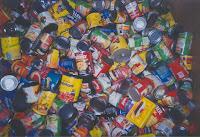 I'm almost certain that Mark Winne is a very nice person. According to his editorial in yesterday's Washington Post, he has spent much of his life working to organize food banks and food drives in an effort to help feed the hungry. Any life dedicated to such services is admirable.
I'm almost certain that Mark Winne is a very nice person. According to his editorial in yesterday's Washington Post, he has spent much of his life working to organize food banks and food drives in an effort to help feed the hungry. Any life dedicated to such services is admirable.Unfortunately, it seems Mark has also dedicated much of his life to being a moron.
See, Mr. Winne has had a recent change of heart. Things he used to believe in and work to create, like charitable food donations, have fallen out of favor in his eyes. Check out his description of US food banks:
"America's far-flung network of emergency food programs -- from Second Harvest to tens of thousands of neighborhood food pantries -- constitutes one of the largest charitable institutions in the nation. Its vast base of volunteers and donors and its ever-expanding distribution infrastructure have made it a powerful force in shaping popular perceptions of domestic hunger and other forms of need. But in the end, one of its most lasting effects has been to sidetrack efforts to eradicate hunger and its root cause, poverty."
I mean, who even hears about poverty anymore? I used to worry about it all the time, but now that there are food banks - fuck it! I'm sure everyone's fine. It's kinda like the Red Cross - ever since they came around, who talks about health care problems anymore? Clearly they convinced Washington and the general public not to worry long ago. Red Cross has things under control.
I'm trying not to be completely cynical here, since I actually sort of agree with part of this article. The idea of creating a population of people dependent on handouts is a little bit scary, and food banks certainly have the potential to do just that. But Winne's conclusion is that the government should be spending lots more money in efforts to "end poverty." In the process he insinuates that private, charitable donations create dependency, while handouts funded by taxpayers on threat of force somehow do not. His thinking reminds me of the now widely-spurned Labor Theory of Value, according to which consumers price goods based on the processes required to create them. The theory is wrong because most people generally don't care how products are made. They value things for what they are as a final product. Diamonds are expensive because they are rare and beautiful, not because people are impressed by the elaborate processes undergone in their extraction from the bowels of the earth.
Along those same lines, people value food because it makes them less hungry. They value donations of foodstuffs because money not spent on food is money that can be spent on other valuable goods, such as more food. And since free food is free food, I doubt people care very much how they get it. They probably would line up in even greater numbers for free handouts of cash, which can be used to buy any product, and which the government already organizes through welfare programs.
Now, welfare programs are widely lambasted for their inefficiencies and lack of poverty alleviation, and I can understand the argument that their real problems come from not enough funding. I don't agree, but I can see the logic. Unconscionable, however, is the implication that the problem of dependency can somehow be solved by more government handouts. Just as food is food, a handout is a handout. I'm not opposed to free food giveaways, but their social effects are undeniable (many of them are good). Very deniable is the idea that a difference exists between a government giveaway and a private giveaway, at least for the recipients. Mark actually sums up my point rather nicely in his article's title:
"When Handouts Keep Coming, the Food Line Never Ends."
Worst of all, though, is Winne's notion that poverty would somehow be alleviated if the following took place:
"Put all the emergency food volunteers and staff and board members from across the country on buses to Washington, to tell Congress to mandate a living wage, health care for all and adequate employment and child-care programs, and you would have a convoy that might stretch from New York City to our nation's capital."
Mandate a livable fu**ing wage??! That's your solution???
Say it with me now:
Price controls cause supply shortages. Low income is better than zero income. Mandated wage floors will not help.
Price controls cause supply shortages. Low income is better than zero income. Mandated wage floors will not help.
Price controls cause supply shortages. Low income is better than zero income. Mandated wage floors will not help.
Mark can ignore the laws of supply and demand all he wants, but they're not going anywhere.
Okay (deep breath). I feel better.

1 comment:
At this time of year, i.e. Thanksgiving, news media are full of reports about how food shelves are running out of food, etc., and how this shows how much worse the economy is than it used to be, in some unspecified golden age. (The ever-declining cost of food as a percent of our income is never mentioned.) It does not seem to occur to the reporters that if you make free food available, people will come and get it. Particularly if you make the free food available without any means test and take all steps possible to make it available without any social stigma, more and more people will come and get it. I don't think that rich people are showing up for free turkeys but it seems lots of poor but not desperate people will accept some help with free food so they can spend the food money on something else. That may not be a terrible thing but the fact that people will take free food - or anything else valuable that is given away - is not evidence that there are more poor people than there used to be. It may be evidence that poor people are smarter than reporters.
Post a Comment